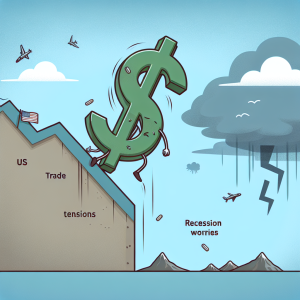Stocks surged following the announcement of a 90-day pause on tariffs by the Trump administration, a move that has sparked a wave of optimism in financial markets. Investors reacted positively as the prospect of escalating trade tensions appeared to diminish, at least temporarily. This decision, aimed at easing tensions with multiple countries, has significant implications not only for the U.S. economy but also for global trade dynamics, including nations like Singapore that are deeply intertwined in international commerce.
The immediate aftermath of the tariff pause saw major stock indices rally, reflecting investor relief. The Dow Jones Industrial Average climbed by over 400 points, while the S&P 500 and Nasdaq also posted substantial gains. Analysts attribute this surge to the belief that a cooling in trade hostilities could stabilize markets and support economic growth. The Trump administration’s decision can be seen as an attempt to balance domestic pressures with the realities of global trade, especially given the complexities surrounding U.S. relationships with key trading partners like China, Mexico, and Canada.
In California, a state heavily impacted by these tariffs, Governor Gavin Newsom has been vocal about the need for strategic partnerships to navigate the economic fallout. California’s economy, which relies on trade for over 40% of its imports and exports, stands to benefit from a reduction in trade barriers. The tariffs had previously raised concerns about inflation, with projections estimating a 2.3% overall rise in consumer prices, particularly affecting food and automotive sectors. By pausing the tariffs, the administration aims to mitigate these inflationary pressures that could hinder consumer spending.
On a broader scale, the tariffs have prompted a reevaluation of trade relationships globally. Countries affected by the tariffs are contemplating reciprocal measures, which could further complicate international trade dynamics. This situation highlights the necessity for balancing national interests with the imperative for cooperative global trade policies. The Trump administration has framed the tariffs as a means to protect American sovereignty and bolster national security by addressing trade imbalances. However, critics argue that such measures could lead to increased costs for consumers and disrupt established supply chains.
For Singapore, the implications of these developments cannot be understated. As a global trading hub, Singapore’s economy is particularly sensitive to shifts in international trade flows. While the immediate effects of the tariff pause may not be directly visible, the potential for increased stability in global markets could benefit Singapore’s trade-dependent economy in the long run. The country’s strategic location and strong trade links mean that any easing of tensions in international trade can foster a more conducive environment for business and investment.
In conclusion, the announcement of a 90-day pause on tariffs has ignited a wave of optimism in the stock markets, reflecting a temporary reprieve from escalating trade tensions. While the long-term effects of this decision remain to be seen, it underscores the complex interplay of domestic and international economic strategies. As nations navigate these turbulent waters, the focus will likely shift towards fostering resilient trade relationships that can withstand future challenges.





